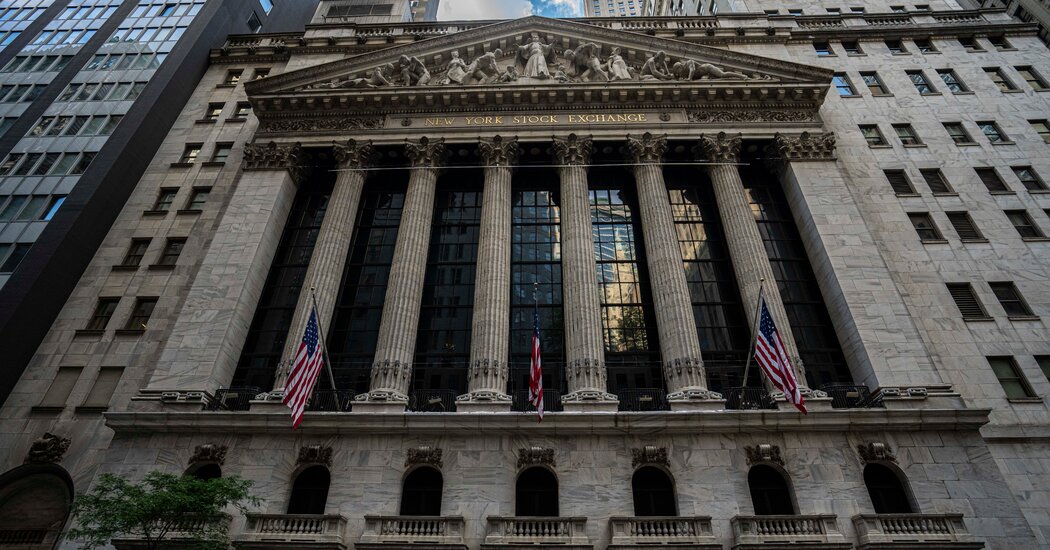More than $4 billion of a newly approved investment product tied to Bitcoin changed hands in the first day of trading on Thursday, as cryptocurrency enthusiasts celebrated a watershed moment for the industry.
Eleven of the products, known as exchange-traded funds, or E.T.F.s, started trading on popular platforms such as the Nasdaq a day after federal regulators authorized them, creating a simpler way for investors to bet on the cryptocurrency markets. Major financial firms, including asset managers like BlackRock and Fidelity, are offering the E.T.F.s.
The early volume was impressive, analysts said, comparing favorably with other E.T.F. debuts. But it may take months to gauge the impact on the cryptocurrency industry, which is still reeling from a recent series of market crashes and high-profile corporate bankruptcies. Initial market data did not show how much new investment flowed into the Bitcoin funds; some of the trading activity may have stemmed from investors who bought shares and quickly flipped them.
“It’s not a one-day event,” said Sandy Kaul, who runs the digital asset arm of Franklin Templeton, a firm offering the E.T.F.s. “Six months is a really good moment to understand: Is this a transformational product?”
Bitcoin’s price briefly rose to $49,000 on Thursday before dipping to $46,000. Optimism that the E.T.F.s were nearing approval by the Securities and Exchange Commission drove Bitcoin’s price up more than 60 percent over recent months to its highest levels since the market imploded in 2022.
The approvals were a major victory for the crypto industry as it gears up for a series of legal battles with the federal government. The S.E.C. has sued Coinbase, the largest U.S. crypto exchange, and several other major firms, arguing that they have illegally marketed unregistered securities, a possible existential threat to the industry.
In a statement announcing the authorization of the E.T.F.s, Gary Gensler, the S.E.C. chair, said the agency did not “approve or endorse Bitcoin.” He said most crypto trading platforms were breaking the law and “often have conflicts of interest.”
Historically, anyone who wanted to invest in Bitcoin or another cryptocurrency had to store the asset in specialized wallets or open accounts on crypto exchanges like Coinbase and Binance, which have faced regulatory scrutiny. Many investors have struggled to understand the intricacies of these online platforms, or have grown frustrated with bugs, hacks and high transaction fees.
An E.T.F. offers a simpler option. Rather than buy Bitcoin outright, with all its risks and inconvenience, investors buy shares in an E.T.F. that contains the currency. The funds are offered on traditional stock exchanges, in a format that many wealth managers have embraced.
Crypto enthusiasts have fought for a Bitcoin E.T.F. for more than a decade, predicting the products would draw billions of dollars in new investment. But the S.E.C. repeatedly rebuffed those efforts, arguing that crypto markets were rife with fraud.
The tide turned in August when the federal appeals court in Washington ruled that the S.E.C.’s rejection of an application by the crypto firm Grayscale Investments was “arbitrary and capricious.” On Wednesday, Mr. Gensler said the ruling had effectively given him no choice but to approve the products.
“Grayscale deserves a huge amount of credit for today,” Brian Armstrong, the chief executive of Coinbase, posted on X on Wednesday. “Absolute legends.” Coinbase is working with several companies offering the E.T.F.s, including BlackRock, to store the Bitcoin contained in the funds.
The 3-to-2 vote to approve the Bitcoin products also exposed divisions within the S.E.C. over crypto regulation. Mr. Gensler sided with two Republican commissioners over the objections of two Democratic commissioners.
In a statement, one of the Democrats, Caroline Crenshaw, cast the approvals as a dangerous mistake that put the agency “on a wayward path that could further sacrifice investor protection.” She cited illegal manipulation of crypto prices, as well as the rampant fraud that sent the industry into a meltdown in 2022.
Hester Peirce, a Republican commissioner who often clashes with Mr. Gensler, also criticized the S.E.C.’s handling of the Bitcoin applications, saying the agency had alienated the industry and created confusion in the market.
“We squandered a decade of opportunities to do our job,” she wrote. “Today’s order does not undo the many harms created by the disparate treatment of spot Bitcoin products.”
The reaction in the finance industry was not universally positive. Vanguard, the investment management company, said it wouldn’t allow its customers to invest in the Bitcoin E.T.F.s.
“These products do not align with our offer focused on asset classes such as equities, bonds and cash, which Vanguard views as the building blocks of a well-balanced, long-term investment portfolio,” said Karyn Baldwin, a spokeswoman.
For now, the approvals have restored some of the enthusiasm that the crypto industry showed in 2021, the last time prices spiked. On Wednesday evening, crypto enthusiasts gathered for a party at Pubkey, a Bitcoin-themed bar in Manhattan. The official X account for Franklin Templeton changed its profile picture to include laser eyes, a popular Bitcoin meme.
“I’ve never seen this much obsession over anything E.T.F.-related,” said Steven McClurg, the chief investment officer for Valkyrie, a firm offering the new Bitcoin product. “It’s very exciting to have a brand-new type of asset class that makes its way into the traditional financial system.”
He has outsize expectations for the market. Mr. McClurg predicted that Bitcoin’s price would skyrocket to more than $150,000 by the end of the year.







